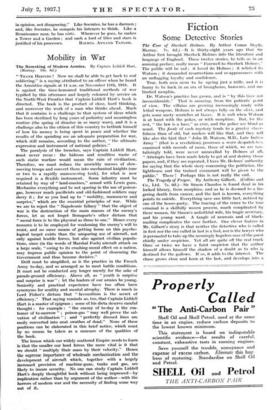A Lord of Lilies
Tins book is an effort to explain Professor Patrick Geddes, who takes all knowledge for his province. How it may affect those who are strange to him I do not know. Those who are long familiar with him will probably feel that the elusive spirit of that surprising and Protean philosopher is hardly captured, although he himself fills many pages with long letters and lectures and reported conversations. This earnest volume does not convey the impression that acquaintance with Patrick Geddes is an amusing as well as a stimulating experi- ence. Yet it can be so. Miss Defries, who followed him about with a small packing-case on which to sit when the remorselessly peripatetic orator stood still, should realize that such devotion is bad for any man, even a prophet.
Here also are tributes from many distinguished friends, the studies by Lewis Mumford and Professor Arthur Thomson being the most illuminating. Certainly some record of the phenomenon, the syndicate of activities known as Patrick Geddes, should pass into literature, for his own medium is conversation ; and, except in some passages of his amazing and far-reaching reports on cities, he has never written any- thing that adequately expresses himself. Great conversation- alists, used to the incentive of the immediate response of listeners, come to dread the solitary labour of writing.
But the style with which to describe the transit through our time of this indomitable mind, attacking at every point the scheme of arranged things, and setting bright lures to attract " the soul of the wide world dreaming of things to come " within a cage of thirty-six squares, should be incisive, fiery, and witty, like his natural, not his acquired self. A saccharine style, to my thinking, is unfair to this Frenchified Scot ; for, whatever his enemies have said, they have never seen him as fatuous.
Still, you will find here an adequate account of all the new movements of which Patrick Geddes has been the true origin ; of the theories which he consistently holds ; and of the famous Notation of Life, which serves as a mystic illumination to some, and a blinding exasperation to others. These last, not having diagrammatic ways of thinking, are apt to find the " Olympos " like an allegorical group for Golders Green, and to murmur, " Not here, 0 Apollo ! " over the " Parnassus."
But to the imaginative dreamer that unfailingly has striven to create and re-create beautiful cities and great gardens; to the ruthless critic who searches out all the follies of effete administrations ; to the visionary who has from the summit of his tower surveyed all the countries of the world ; to the intellectual swordsman whose play will always renew a weary or dejected mind ; to the biologist who can communicate a true ecstasy -from the • lilies, the orchids, the date-palms ; to the wise eugenist who knows that malady may be incident to genius ; and most of all, to the leader of forlorn-hopes who does not count the cost, all idealists and crusaders give their unstinted admiration, and gladly keep him company, "except
in opinion, not disagreeing." Like Socrates, he has a daemon ; and, like Socrates, he compels his listeners to think. Like a Renaissance man, he has virtu. Wherever he goes, he makes a Tower and a Garden ; and such a lord of lilies and stars is















































 Previous page
Previous page